The head of the United Nations nuclear watchdog on Monday said Iran’s nuclear material production was growing, the BBC reported, and the International Atomic Energy Agency (IAEA) leader also expressed he was “worried” about the overall situation. That same day, Iran’s Foreign Minister had the audacity to point the finger at Israel’s defensive nuclear program as a threat in the region.
Per a report by the Fars News Agency, Mohammed Zarif referenced comments made by Israeli Prime Minister Benjamin Netanyahu a year ago outside the Dimona nuclear plant warning Israel’s enemies in general of the severe consequences of attacking Israel. That not-so-subtle self-defense rhetoric, however, pales in comparison to the Iranian comments about destroying Israel, in self-defense or otherwise. And Netanyahu pointed to that hostility in turning the tables on Zarif in comments on Monday.
“Zarif is lying again. Iran is the one that openly threatens, every day, to destroy the State of Israel. Iran continues to entrench itself militarily in Syria. And today, the IAEA reports that Iran is accelerating its nuclear program,” said Netanyahu in comments released by his office. “I repeat: Israel will not allow Iran to develop nuclear weapons that threaten our existence and endanger the entire world.”
That threat is growing. The Director General of the IAEA, Yukiya Amano, told a news conference that production by Iran of enriched uranium had expanded, noted BBC in their report, although Amano was not able to comment on when that increase would violate limits under the nuclear deal with the major world powers—known as the Joint Comprehensive Plan of Action (JCPOA).
However, in separate comments published to the IAEA website, Amano told the IAEA Board of Governors that “I am worried about increasing tensions over the Iranian nuclear issue.”
“As I have constantly emphasized, the nuclear-related commitments entered into by Iran under the JCPOA represent a significant gain for nuclear verification,” said Amano. “I therefore hope that ways can be found to reduce current tensions through dialogue. It is essential that Iran fully implements its nuclear-related commitments under the JCPOA.”
The United States, after repeatedly calling for a supplemental agreement to the JCPOA that better addressed Iran’s malignant activity, withdrew from the JCPOA and has since increased sanctions on Iran in an effort to change that behavior. Europe has yet to effectively mitigate those sanctions.
On Monday, Amano acknowledged that Iran on May 8 declared they were withdrawing from some elements of the JCPOA obligations. On Sunday, Zarif re-emphasized that point and reiterated the threat that Iran would continue to expand their nuclear program unless Europe gave them additional economic relief.
In another report by Fars, Zarif noted that the 60-day deadline for Europe to act was coming to an end. “If they claim to have made efforts which have failed to end up in results, then, we can also make efforts without any results being produced from now on,” Fars quoted Zarif as saying.
Of course, despite his rhetoric, Zarif hasn’t forgotten Netanyahu’s warning from last March, in case Iran eventually cross the line and develop nuclear weapons to threaten Israel.
“From here I would like to deliver a message to anyone who tries to attack our citizens,” said Netanyahu in comments published by his office in 2018 at Dimona. “The equation is simple: Whoever tries to hurt us—we will hurt them. Israel will not tolerate any attempt to attack us. We will take determined action in order to prevent this. It must be understood—it is impossible to attack us without paying a very heavy price.”
(By Joshua Spurlock, www.themideastupdate.com, June 10, 2019)

